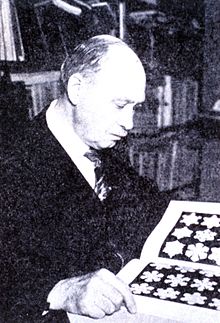William Jackson Humphreys
William Jackson Humphreys (born February 3, 1862 in Gap Mills , Virginia , † November 10, 1949 in Washington, DC ) was an American atmospheric physicist.
Humphreys studied physics and meteorology at Washington University, Lee University, Virginia and Johns Hopkins University , from which he received his Ph.D. in 1897. received. There he studied under Henry A. Rowland, among others . He mainly worked in the fields of spectroscopy, atmospheric physics and meteorology. In the field of physics , he also succeeded in proving pressure broadening (the shifting of spectral lines under pressure ) - his most important achievement in meteorology was a very good description of the stratosphere (1909). He wrote numerous textbooks and held a few lectureships. From 1905 to 1935 he worked in the US weather service. In 1920, Humphreys found a possible explanation for the year without a summer 1816. This was due to a volcanic winter as a result of the eruption of the Indonesian volcano Tambora in April 1815 .
In 1921 Humphreys was elected to the American Academy of Arts and Sciences and in 1929 to the American Philosophical Society . The Humphreys Ice Rise in Antarctica is named in his honor.
Web links
Individual evidence
- ↑ The year in which the summer failed completely , article from March 26, 2013 by Berthold Seewald on Welt Online
- ↑ Member History: William J. Humphreys. American Philosophical Society, accessed October 6, 2018 .
| personal data | |
|---|---|
| SURNAME | Humphreys, William Jackson |
| BRIEF DESCRIPTION | American atmospheric physicist and meteorologist |
| DATE OF BIRTH | February 3, 1862 |
| PLACE OF BIRTH | Gap Mills , Virginia |
| DATE OF DEATH | November 10, 1949 |
| Place of death | Washington, DC |
